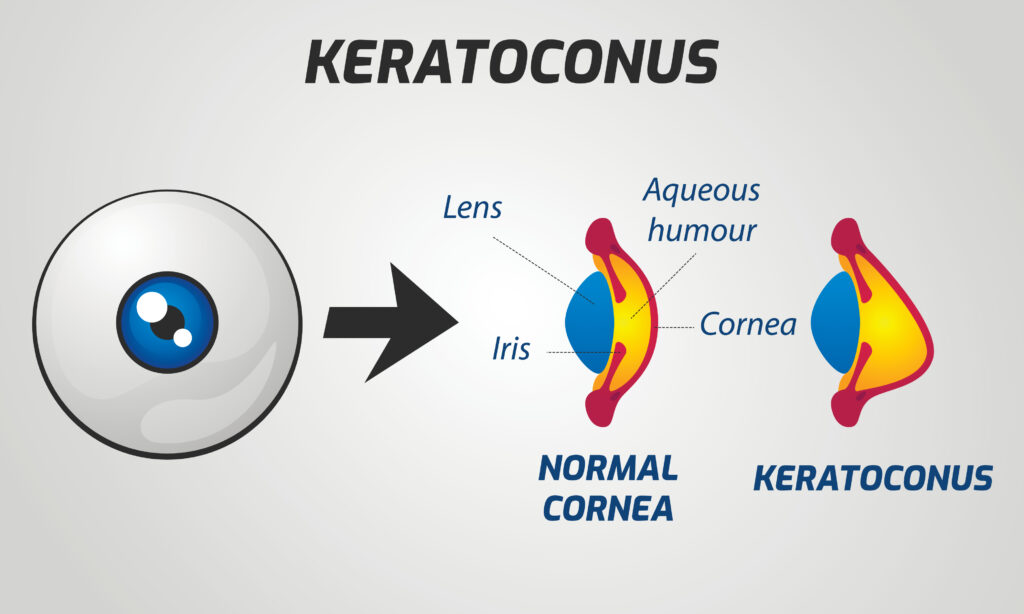Keratoconus is a progressive eye condition that can worsen over time and significantly impact your vision. Timely intervention is essential. While glasses are often the initial correction, they may become insufficient as keratoconus advances, making alternative options like specialized contact lenses necessary for clearer vision. Keep reading to discover how contact lenses can benefit patients with keratoconus.
What is Keratoconus?

Keratoconus is a condition where the cornea—the transparent, dome-shaped front layer of the eye—becomes thin and protrudes outward into a cone shape. The cornea’s irregular shape results from weakening of collagen fibers, tiny protein structures that hold the cornea in place. When these fibers weaken, the cornea bulges. This abnormal shape distorts vision and can cause discomfort.
Typically affecting both eyes, keratoconus often begins during the teenage years or early adulthood but can occur in childhood or later in life. Although the exact cause is unknown, risk factors include:
- A family history of keratoconus
- Excessive or vigorous eye rubbing
- Inflammation from asthma, atopic eye disease, or allergies
- Certain conditions, such as Ehlers-Danlos syndrome, Marfan syndrome, Down Syndrome, retinitis pigmentosa, or osteogenesis imperfecta.
What are the Symptoms of Keratoconus?
In the early stages of keratoconus, you may experience symptoms such as:
- Slightly blurred and distorted vision
- Frequent changes in eyeglass or contact lens prescriptions
- Increased sensitivity to glare and light
As the condition progresses, your symptoms may include:
- Increased astigmatism and/or nearsightedness
- More pronounced distorted and/or blurred vision
- Difficulty wearing contact lenses
How Can Contact Lenses Help with Keratoconus?
Initially, mild keratoconus can often be corrected with glasses or soft contact lenses. However, as the condition advances, these options may no longer provide sharp, clear vision. Specialized contact lenses are often required to achieve optimal visual acuity. The choice of contact lens depends on the severity of keratoconus and can include:
Rigid Gas Permeable (RGP) Lenses

Rigid gas permeable lenses are made of a hard oxygen-permeable material that lets your cornea breathe better for optimal eye health.
Unlike soft contacts, which can take the shape of an irregular cornea, distorting vision, RGP lenses maintain their shape within the eye, creating a smooth surface over the irregular cornea. This corrects astigmatism and provides crisp, stable vision. RGP lenses can be customized to fit most eye shapes but may require an adjustment period.
Hybrid Lenses
Hybrid contact lenses offer the best of both worlds, delivering the visual clarity of RGP lenses and the comfort of soft contact lenses. They feature a rigid center that vaults over a keratoconus cornea, correcting blurred, distorted vision, and a soft skirt around the lens that ensures comfort and keeps the lens in position.
Scleral Lenses
Scleral lenses are large-diameter lenses that vault over a bulging cornea and rest on the sclera, or the white of the eye, reducing direct contact between the sensitive corneal surface and the lens. They create a fluid reservoir over the cornea, offering excellent vision correction while reducing irritation and dryness. This minimizes friction and irritation, ensuring a more comfortable fit.
Are There Other Treatment Options for Keratoconus?
Yes. Several treatments can help manage keratoconus, including:

Corneal Crosslinking
A minimally invasive procedure that involves applying riboflavin (vitamin B2) drops to strengthen corneal collagen fibers. When activated by UV light, these fibers form additional bonds, which can halt or slow disease progression, helping preserve vision.
Corneal Transplant
In severe cases, a corneal transplant may be necessary. This involves replacing the damaged cornea with healthy donor tissue. While effective, it may take a year or more for your vision to stabilize, and additional corrective lenses are often needed afterward.
Better Vision Starts Here
Various contact lenses can significantly improve quality of life for patients with keratoconus. The best approach is personalized care—our expert ophthalmologists at Williamson Eye Center will assess your condition and recommend the most suitable vision correction options to ensure your eyes stay healthy and your vision clear.
Interested in contact lenses for keratoconus? Schedule an appointment at Williamson Eye Center in Baton Rouge, LA, today, and take the first step toward sharper, more comfortable vision.



